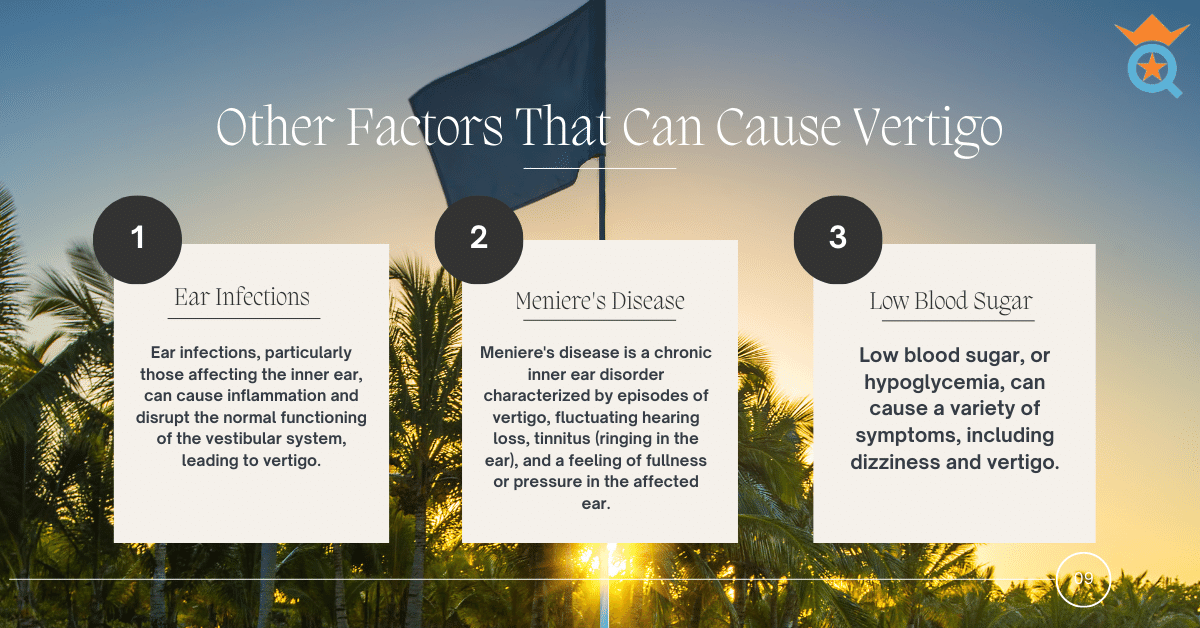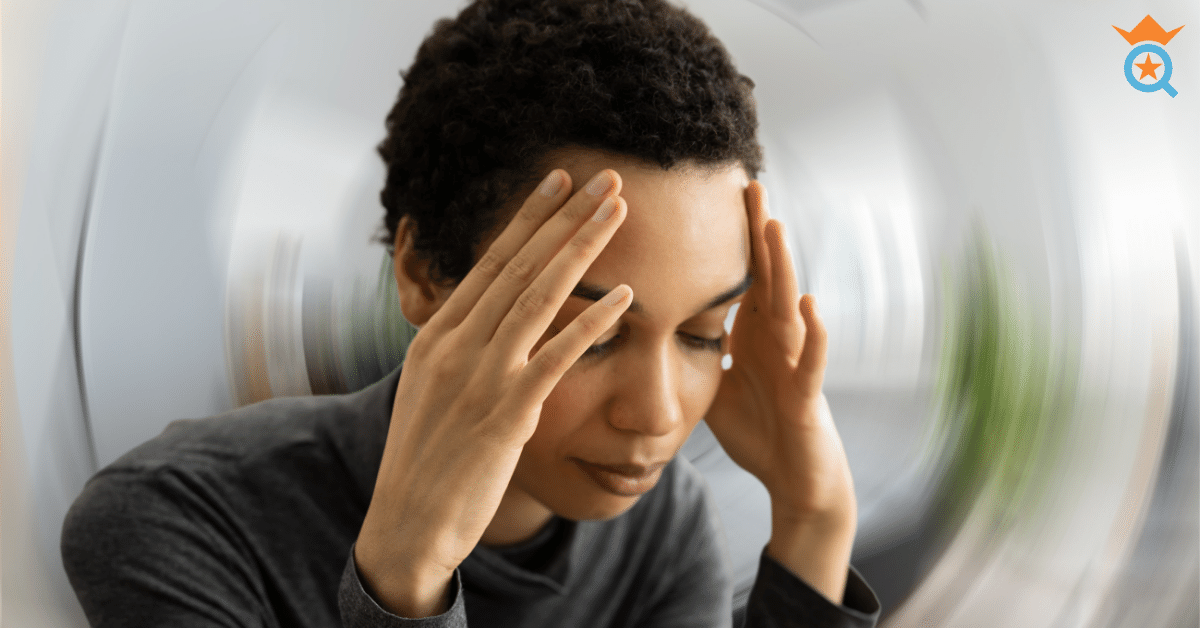In the 115th U.S. Open at Chambers Bay Golf Course, professional golfer Jason Day faced a challenge beyond the uneven terrain: vertigo. His struggle with this debilitating condition captivated audiences and raised awareness about the symptoms and effects of vertigo.
Characterized by dizziness, the sensation of spinning, and sometimes nausea, vertigo can significantly impact an individual's daily life, including their ability to participate in sports like golf.
This article delves into the relationship between golf and vertigo, exploring potential causes, treatments, and ways to manage this condition on the course.

What is Benign Paroxysmal Positional Vertigo (BPPV)?
Benign Paroxysmal Positional Vertigo (BPPV) is a common form of vertigo characterized by brief episodes of dizziness, often triggered by changes in head position. BPPV is considered benign because it is not life-threatening, although the symptoms can be quite distressing for those affected.
The inner ear plays a crucial role in the development of BPPV. Within the inner ear, there is a structure called the vestibular labyrinth, which contains fluid-filled canals and sensory receptors responsible for detecting head movement and maintaining balance. When the head rotates or changes position, the fluid inside the canals moves, causing the sensory receptors to send signals to the brain.
BPPV occurs when tiny calcium carbonate crystals, known as otoconia, become dislodged from their usual location in the inner ear and enter the semicircular canals of the vestibular labyrinth.
As the head moves, these crystals cause the fluid within the canals to be displaced, resulting in abnormal signals being sent to the brain. This disruption in the signaling process is what leads to the characteristic spinning sensation and dizziness associated with BPPV.
Head rotation and changes in position are common triggers for vertigo attacks in those with BPPV. Simple movements like tilting the head, looking up or down, or rolling over in bed can be enough to provoke an episode. The duration of these attacks can vary but are typically short-lived, lasting from a few seconds to a couple of minutes.
Can Playing Golf Cause Vertigo?
Playing golf in itself is not a direct cause of vertigo, but certain aspects of the sport could potentially exacerbate or trigger symptoms in individuals with an existing predisposition to vertigo, such as those with BPPV.
Some factors related to golf that may contribute to dizziness include:
- Head rotation: Golf swings involve significant head rotation, which could potentially dislodge inner ear crystals and trigger vertigo attacks in susceptible individuals. Monitoring and controlling head movement during the swing could help minimize the risk of triggering symptoms.
- Terrain: Golf courses often feature uneven terrain, slopes, and elevation changes. Navigating these surfaces may pose a challenge for individuals with balance issues or those prone to vertigo, as it may increase the likelihood of head movement that triggers symptoms.
Given these factors, golfers with a history of vertigo need to pay close attention to their head rotation and position during play. Some important considerations include:
- Maintaining smooth and controlled head movement during swings to minimize the risk of triggering vertigo attacks
- Using caution when navigating uneven terrain, slopes, or changes in elevation on the golf course
- Taking breaks or slowing down play if symptoms arise to allow time for recovery and to reduce the risk of falls or injuries due to dizziness
Other Factors That Can Cause Vertigo
Ear Infections
Ear infections, particularly those affecting the inner ear, can cause inflammation and disrupt the normal functioning of the vestibular system, leading to vertigo. Infections may be viral or bacterial and often present with other symptoms, such as pain, fever, and hearing loss. Treatment for ear infections typically involves medication, such as antibiotics or anti-inflammatory drugs, and addressing the underlying cause, if known.
Meniere's Disease
Meniere's disease is a chronic inner ear disorder characterized by episodes of vertigo, fluctuating hearing loss, tinnitus (ringing in the ear), and a feeling of fullness or pressure in the affected ear. The exact cause of Meniere's disease remains unknown, but it is believed to be related to an abnormal buildup of fluid in the inner ear. Treatment for Meniere's disease may involve medications, changes in diet, and some cases, surgical intervention.
Low Blood Sugar
Low blood sugar, or hypoglycemia, can cause a variety of symptoms, including dizziness and vertigo. Inadequate glucose levels in the bloodstream can impair brain function, affecting balance and coordination. Low blood sugar can result from several factors, including missed meals, excessive physical activity, or certain medical conditions.
To prevent hypoglycemia-related vertigo, it is essential to maintain stable blood sugar levels by eating regular meals, managing stress, and consulting with a healthcare professional for proper guidance.
In addition to these causes, rides, particularly those involving spinning motions or sudden changes in direction, can induce temporary vertigo due to the rapid movement of fluid in the inner ear's vestibular system. This sensation typically subsides once the ride stops and the fluid in the inner ear returns to equilibrium.

Can You Play Golf with Vertigo?
Jason Day's experience of playing golf with vertigo serves as an inspiring example for others who may be facing similar challenges. Despite collapsing from dizziness during the second round of the 115th U.S. Open, Day persisted, receiving treatment and completing the final rounds of the tournament.
His determination and resilience showed that it is possible to play golf while managing vertigo symptoms, although it may be more challenging and require extra precautions.
Playing golf with vertigo poses certain challenges and risks, including:
- Difficulty maintaining balance, especially on uneven terrain or while executing swings
- Increased risk of falls or injuries due to dizziness and disorientation
- Decreased concentration and focus, which may affect performance
To mitigate these challenges, players with vertigo can consider implementing certain accommodations:
- Taking breaks: Allowing time for rest and recovery between holes or shots can help minimize the impact of vertigo symptoms. This approach may also provide an opportunity for players to perform vestibular exercises or other techniques to alleviate dizziness.
- Modifying head movements: Adjusting the golf swing to reduce excessive head rotation or abrupt changes in head position can help minimize the risk of triggering vertigo symptoms.
- Seeking medical advice: Consulting with a healthcare professional can guide managing vertigo symptoms, including medication, vestibular therapy, or lifestyle changes that may improve the golfing experience for those with vertigo.
By incorporating these accommodations and working closely with a healthcare professional, individuals with vertigo can continue to enjoy the sport of golf while minimizing the impact of their symptoms on their performance and well-being.
Treatment and Management of Vertigo for Golfers
Golfers experiencing vertigo can benefit from various treatment options and management strategies to help alleviate symptoms and improve their performance on the course.
Treatment options for vertigo include:
- Vestibular exercises: These are specialized exercises designed to retrain the brain and vestibular system to adapt to changes in head position, reduce dizziness, and improve balance. Examples of vestibular exercises include the Epley maneuver, Brandt-Daroff exercises, and gaze stabilization exercises.
- Medication: In some cases, medication may be prescribed to manage vertigo symptoms. These can include anti-vertigo medications, anti-nausea drugs, or medications to address underlying conditions, such as ear infections or Meniere's disease.
Consulting with a physician is crucial for the proper diagnosis and management of vertigo. A healthcare professional can identify the underlying cause of vertigo, recommend appropriate treatment options, and provide guidance on how to manage symptoms during daily activities, including golf.
Tips for golfers with vertigo include:
- Monitoring head rotation during swings to minimize abrupt changes in head position and reduce the risk of triggering vertigo symptoms
- Staying hydrated to maintain overall health and prevent dehydration, which can exacerbate vertigo symptoms
- Managing low blood sugar levels by eating regular meals, consuming balanced snacks, and adjusting meal timing to ensure stable blood glucose levels during golf rounds
Golfers with vertigo can benefit from a combination of treatment options, proactive management strategies, and accommodations to minimize the impact of their symptoms on their performance and enjoyment of the sport.
By working closely with a healthcare professional and implementing these recommendations, individuals with vertigo can continue to participate in the game they love.

In conclusion
While golf itself is not a direct cause of vertigo, certain aspects of the sport, such as head rotation during swings and uneven terrain, can potentially trigger or exacerbate vertigo symptoms in susceptible individuals. The inspiring example of Jason Day demonstrates that it is possible to play golf with vertigo, albeit with some additional challenges and precautions.
It is essential for those experiencing vertigo symptoms to seek medical advice before playing golf to ensure a safe and enjoyable experience. Proper diagnosis, treatment, and management of vertigo can help minimize its impact on golf performance and overall well-being.
By working closely with a healthcare professional and implementing recommended accommodations and strategies, golfers with vertigo can continue to enjoy the sport while maintaining their health and safety on the course.
FAQs
Why do I feel dizzy while playing golf?
Dizziness during golf might be a result of benign positional vertigo, a condition that arises when tiny crystals within the inner ear become dislocated and enter one of the semicircular canals. According to Dr. Miller, these canals are situated in the ear's vestibular labyrinth and contain fluid and sensors responsible for tracking head movement. An inner ear problem involving the dislodged crystals can cause the semicircular canals to become sensitive to changes in head position, leading to a person feeling dizzy – particularly during activities like golf that involve monitoring head rotation.
Is vertigo caused by a lack of iron?
It's common for individuals to assume they have anemia when they frequently experience dizziness or vertigo, particularly during transitions from sitting to standing or vice versa. Dr. Nguyen Canh Nam, a neurology specialist, confirms that this suspicion has some merit, but it is not sufficient to pinpoint the exact issue. Vertigo can have various causes, such as ear infections, specific conditions like Jason Day's vertigo, or even certain activities like golf that involve significant head movement. A thorough evaluation by a healthcare professional is necessary to determine the cause of dizzy spells or vertigo attacks.








